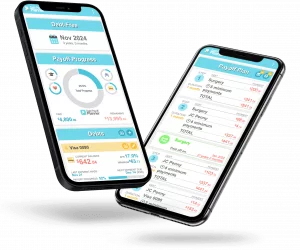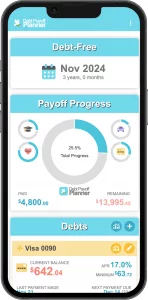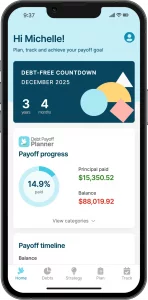Budgeting and financial planning are two things that go side by side. Whether you want to increase your savings or you’re looking for a debt management plan, you must make a proper budget.
People who have a budget make mistakes during the planning that derail their entire plans. They miss out on small things when planning a budget that leads them to overspend and borrow more, resulting in increased debts. One of the key things about budgeting is projecting all the expenses appropriately.
Some of these miscalculations set them off track and misbalance their entire budget. So, to help you out, we will discuss some mistakes people make when planning a budget and how you can avoid them.
Mistake #1 – Not Setting a Realistic Budget
The main mistake many people make when planning a budget is not setting realistic expectations. It occurs when people either under-budget or over-budget a particular item on their list.
This could completely derail your planning. It can also lead to more debt as people will opt for loans and credit cards to fill the void in the budget.
This often happens due to the unrealistic expectations you are looking to fulfill in your budget. While it may look effective on paper, you will find a completely different story in reality where you can end up spending more than your set limits.
Solution
The best way to solve this problem is by calculating the amount you spend on each category accordingly. You can look at the expenditures of the last month to know the money that you spend on groceries, credit card bills, etc. You can use numerous budgeting apps available to track expenses.
Also, it will help you identify areas where you might be overspending or under-spending. For instance, if you are spending too much on going out, you can cut back on it and divert the funds towards your debt management plan.
In a nutshell, all you have to do is track all your expenses and adjust them to fix your budget. It will help eliminate any disruptions you face when spending on different items.
Mistake #2 – Cutting Back on Emergency Savings
Creating a budget means allocating a specific amount for each expenditure. Many people go with this strategy, and to inject more money into other expenses, they cut back on their emergency savings.
This budgeting mistake can further drown you into debt, as you won’t be having enough money to cover any urgent or unexpected expense.
As per the Federal Reserve, around 39% of Americans don’t have an additional $400 in their account. If there is a blip in their expenditure, it can disrupt their entire budget and burden their finances. So, if you are one of them, you need to set aside money for your emergency savings quickly.
Solution
If you want to avoid his mistake, the first thing that you need to do is create an emergency fund. You can start with a small amount or proportion of your salary and gradually increase it with time. You can also set small limits that you have to achieve in a period.
Then, you can allocate funds accordingly for your emergency fund. Also, you can put your savings in a fixed deposit where you can get a return on it. This will allow you to build an emergency fund while increasing your savings. Therefore, it will be a win-win situation for you.
Mistake #3 – Failing to Update your Budget
There is a chance you find the appropriate budget that fulfills all your needs, helps you save money, and reduces your debt. However, whenever you go through a changing financial situation, you need to update your budget.
It will help you revise your saving goals and help you find small areas through which you can save money. Even if you feel you are on track with your budget, you should revise and update it.
Solution
It is ideal to update and tweak your budget every time your financial situation changes. These are some of the instances where you might want to reconsider your spending and saving habits:
- Getting a raise
- Increasing your income stream by starting a new business or side hustle
- Incurring a major expenditure
- Going for a vacation or spending on gifts on the holiday season
Also, you must look at some aspects when updating your expenses. You should consider all the income streams and have all the expenses in the budget.
In addition, you need to prioritize and emphasize increasing your savings and reducing your debt. It will help you get in a much better financial situation once you complete revising and updating your budget.
Mistake #4 – Failing to Keep on Track as per the Budget
Budgeting is not only about allocating money to expenditures on paper, but it is about sticking to it by rigidly following the set limits. Many people have a robust plan and budget but cannot keep track. As a result, they overspend on the limit set for a particular expense.
It is quite common for people to overspend when going out with their friends. The idea of missing out with friends leads to overspending. Usually, these expenses go on credit cards which means an increase in debt with high-interest rates.
All-in-all, it can disrupt the entire budget and plunge you into more high-interest debts. Now you don’t want to miss out with your friends while sticking to your budget. So, what is the solution for it? Let’s find out.
Solution
Spending quality time with your friends can be a great mood lifter, but it is imperative to stay within a limit. You can feel free to relay this message to your close ones, and they will understand your situation. The ideal way to deal with this problem is by creating a wiggle room.
Wiggle room is the amount you set aside if you want to overspend on anything. It gives you some space to cross the limit and enjoy your experience while helping you stay within budget.
Therefore, the ideal way to avoid this problem is by having a wiggle room and ensuring that you don’t cross the set limit on other items.
Mistake #5 – Not Taking into Account Every Expenditure
Many people omit and don’t record all their expenses in their budget. It’s either a minor expenditure, or they will deal with it when the time comes. In both cases, it is essential that you take them into account and set a limit for those budgets beforehand.
Since many people don’t incorporate all expenses in their spending plan, they often take on more debt. It will hurt your debt management plan if you cross your budget.
Solution
To avoid this common mistake, you need to forecast and record every expense you will incur. Although you might not know the amount you need for that expense, it will still be better than setting aside no money at all. Look at the events you need to plan for, like weddings, school or business trips, etc.
By thoroughly planning ahead of time, you can forecast future expenses. These expenses will be out of your regular spending patterns, so you need to plan how much you allocate for them. Also, have a backup plan regarding what to do if you fall short or have excessive funds.
Mistake #6 – Not Discussing with Your Family
Budgeting is a process that requires the involvement of each family member. So, if you are keeping them out of discussions, it will be difficult for you to stay on track.
Also, it can impact your debts and expenses. Without aligning your goals, such as saving, or debt reduction, there will be little progress.
Solution
The best way to deal with this problem is to sit down with your partner and plan the budget together. You can set a limit for each thing and help each other avoid crossing that limit. Also, it can help you find out all the unnecessary expenditures you can cut back on.
Though there can be disagreements on a few things, overall, you will stay within limits set in the budget with small compromises.
Takeaway
These are some common mistakes that many people make when making a budget. You can reduce your debt while enjoying your life if you can avoid these mistakes.
To summarize, all you have to do is set a realistic budget with a savings plan or emergency fund and consider all the expenses you incur. Also, it is imperative to revise your budget every time your financial situation changes.
Don’t forget to include a section for your retirement and debt management plan. Both things should be a part of your budget to help you save for your future.
Whether it’s a promotion, new income stream, or anything else, your budget needs to have the correct figures for each expense. Though creating a budget and sticking to it is a difficult task, it is vital for the surety of your financial wellbeing.















